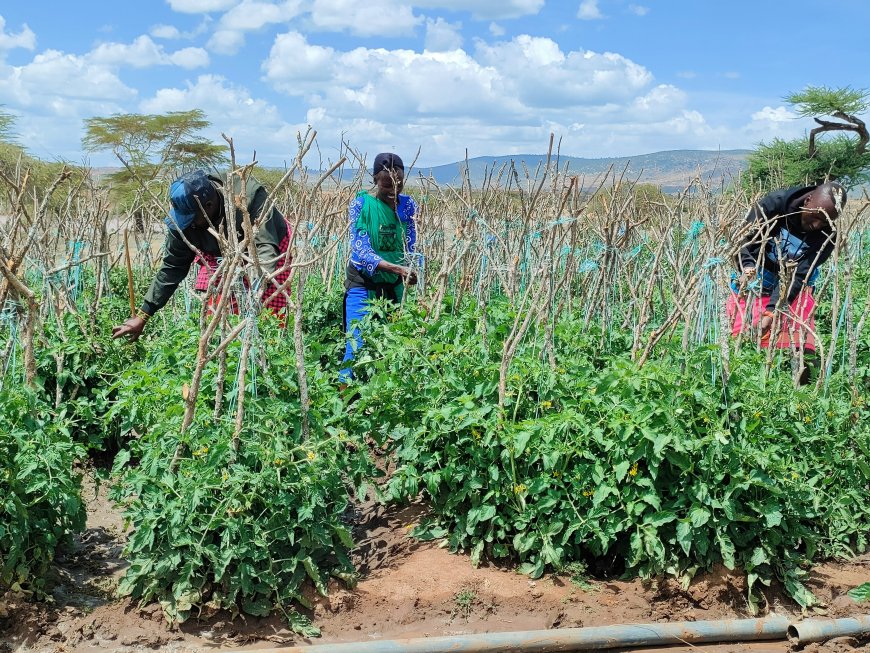KVDA focuses on water availability to encourage diversification in the Kerio Valley basin

Eldoret,
Thursday, November 9, 2023
KNA by Kiptanui Cherono
For decades, the Kerio Valley basin, in the North Rift region, has been synonymous with deadly banditry attacks that have caused untold suffering characterized by deaths and lifelong injuries to the residents of the valley.
The deadly raids perpetrated by heavily armed cattle rustlers have for many years frustrated government socio-economic development programmes rendering the region to remain perpetually marginalized.
Although the cattle raids were hitherto linked to outdated cultural practices associated with dowry and marriages, this has since spiralled into murderous attacks that spare neither children, women nor the elderly.
However, researchers, opinion leaders, and other civil society associations have cited scarcity of resources such as inadequate water and pasture caused by the harsh climatic conditions as some of the reasons for capacitating and fuelling banditry in the Kerio Valley.
But with the guns gradually going silent following a decisive move by the current government to deal with the menace head-on, there is a ray of hope for peace reigning, hence giving room for development programmes to be implemented.
Already, there is a sustained campaign by government and non-state actors, led by the Kerio Valley Development Authority, KVDA, across the cattle rustling scarred counties of Turkana, West Pokot, ElgeyoMarakwet, Baringo, and Samburu for the pastoralist communities to diversify their source of livelihood from solely relying on the conventional livestock keeping to crop farming.
The challenge facing the communities who are ready to try out horticulture as a source of livelihood is the lack of adequate water to sustain crop farming as well as for domestic use and livestock considering that the region is largely arid and semi-arid, coupled with the effect of climate change.
To address these challenges, KVDA has pumped in Sh. 550 million to enhance water availability increase food security through irrigation, and transform the region from relief food-reliant to food-secure.
KVDA Managing Director Sammy Naporos said the funds will go towards the construction of 24 boreholes, six water pans, and three small-scale dams across the region. “Some of the projects are already complete and in use, others are in the process,” said the MD during an interview with KNA in his Eldoret office.
“We intend that this programme will ensure water access because we are focusing on offering alternative livelihood sources for the residents. We realize the big stock, cattle, sheep, and even camels have been the major contributors to cattle rustling and banditry, and therefore the need for a paradigm shift from relying purely on pastoralism and opting for crop farming to address the rampant cases of insecurity.
Already, Mr. Naporos said the beneficiary communities have been trained in crop farming, and some are already into vegetable growing which has offerred sustainable food and income for the families.
He adds that although what they have input might be a drop in the vast region, he hoped it would create a positive impact on the communities as well as build resilience against climate change.
In Samburu County, Noontoto village, KVDA constructed a 40,000 cubic metre dam, benefiting 3,000 households as well as providing water to 50,000 livestock as well as wildlife.
“Because of this intervention by KVDA, we have witnessed a gradual shift from traditional livestock keeping to horticulture, scores of farms are mushrooming in the neighbouring villages as herders take up vegetable framing through irrigation, tomatoes, kales, cabbages, capsicum, potatoes, and traditional vegetables are sprouting up,” according to Kimia Lolmeweti, one of the pioneer crop farmers in the village.
Lolmeweti said he has used water from the dam to irrigate his one-acre farm growing vegetables for subsistence use and commercial purposes.
“I already sold the first harvests to vegetable vendors within my neighbourhood of Kisima centre and also to those from Maralal town and managed to earn more than Sh. 15,000 from tomatoes alone,” says an elated Lolmeweti.
He adds that traditionally the Samburu are pastoralists and their entire livelihoods centre around livestock, but since KVDA constructed the dam, he says, a section of the community is embracing vegetable and fruit farming as an economic activity.
More than 20 vegetables, fruit, and crop farms have sprouted in the area around the dam as a result of the KVDA project, said Lolmeweti adding that though, most parts of Samburu have high potential for crop farming, erratic rains and a general lack of water. “The community relies on livestock for its livelihood although we sometimes lose entire stock due to erratic weather patterns,” he explains.
The secretary for the Noontoto dam water users Anne Naomi is full of praise for KVDA for remembering the community with such an initiative saying from the food they now grow, the region has experienced improved nutrition of its people, especially children.
Getting enough food in the past was a major challenge for us but now we can grow our food using water from this dam which in turn has satisfied the nutritional needs of the community. This project has changed our fortunes,” said Naomi.
KVDA chairman Mark Chesergon said KVDA has nurtured over two million fruit seedlings which have been distributed to farmers in the region as part of efforts to enhance environmental conservation, along the Kerio Valley basin which has over time been highly degraded.
Chesterton said they have rolled out sustainable conservation efforts which involve the supplying of mango, avocado, and tree seedlings to farmers for both environmental conservation and income generation through the sale of the fruits.
Courtesy; KNA
What's Your Reaction?



































































































































































































































































































